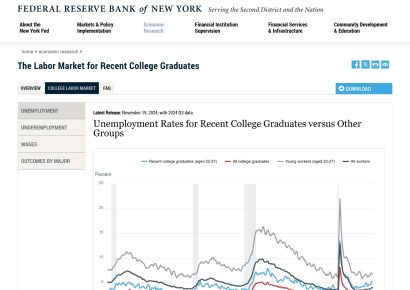College Majors with the Highest Unemployment Rates
Labor Market Data for Recent College Graduates from the Federal Reserve Bank of New York
Click here to go to the Latest Interactive Wage and Employment Data
(From: Federal Reserve Bank of New York Economic Research)
Determining which majors have the highest unemployment rates can be challenging due to variations in data collection methods, timeframes, and regional differences. Additionally, unemployment rates can fluctuate over time due to changes in economic conditions and industry trends. However, some studies and reports provide insights into majors that may have higher unemployment rates than others.
These may include:
- Fine Arts: Majors in fine arts, such as painting, sculpture, and performing arts, may face challenges in finding stable employment due to the competitive nature of the field and limited job opportunities.
- Film Studies and Media Arts: Majors in film studies, media arts, and related fields may encounter difficulties in securing full-time employment, particularly in highly competitive industries such as film production, broadcasting, and journalism.
- Anthropology and Archaeology: Majors in anthropology, archaeology, and related social sciences may experience higher unemployment rates compared to other fields due to limited job opportunities and funding for research positions.
- Hospitality and Tourism: Majors in hospitality management, tourism, and related fields may face challenges in finding stable employment, particularly during economic downturns or disruptions in the travel and hospitality industry.
- Liberal Arts and Humanities: Majors in liberal arts and humanities fields, such as philosophy, literature, and history, may encounter difficulties in translating their skills and knowledge into specific career paths, leading to higher unemployment rates in some cases.
- Criminal Justice and Law Enforcement: Majors in criminal justice, law enforcement, and related fields may experience higher unemployment rates due to competition for limited job openings in law enforcement agencies and the criminal justice system.
- Psychology and Social Sciences: Majors in psychology, sociology, and other social sciences may face challenges in finding employment directly related to their field of study, leading to higher unemployment rates among recent graduates.
It's important to note that while some majors may have higher reported unemployment rates than others, individual outcomes can vary based on factors such as location, work experience, networking, and additional skills or qualifications. Additionally, pursuing a major solely based on its perceived employment prospects may not lead to long-term satisfaction if it does not align with your interests, values, and career goals. It's essential to choose a major that both interests you and offers opportunities for personal and professional growth.
Employment
Fields of study with high employment rates often align with industries that are experiencing growth, have consistent demand, or require specialized skills that are in demand. While employment prospects can vary based on factors such as location, experience, and individual circumstances, some majors tend to have higher employment rates than others. Here are a few examples:
- STEM Majors:
- Majors in Science, Technology, Engineering, and Mathematics (STEM) fields typically have strong employment prospects due to high demand for technical skills and expertise. Examples include Computer Science, Engineering (various disciplines), Data Science, and Mathematics.
- Healthcare Majors:
- With an aging population and ongoing advancements in medical technology, healthcare-related majors offer excellent employment opportunities. Examples include Nursing, Physician Assistant Studies, Pharmacy, Physical Therapy, and Occupational Therapy.
- Business and Management Majors:
- Majors in business-related fields often lead to diverse career opportunities in various industries. Examples include Accounting, Finance, Management, Marketing, and Business Administration.
- Education Majors:
- Despite fluctuations in education funding, there is typically consistent demand for qualified educators. Majors in Education, particularly in high-demand areas like Special Education, Mathematics Education, and Science Education, can lead to stable employment.
- Information Technology (IT) and Computer Science:
- With the increasing reliance on technology across industries, majors in IT and Computer Science offer strong employment prospects. Roles such as Software Developer, Network Administrator, Systems Analyst, and Cybersecurity Specialist are in high demand.
- Engineering and Technology Management:
- Majors that combine engineering or technical skills with business acumen, such as Engineering Management, Technology Management, or Project Management, can lead to lucrative career opportunities in industries like manufacturing, construction, and technology.
- Environmental Science and Sustainability:
- As awareness of environmental issues grows, there is increasing demand for professionals with expertise in environmental science, sustainability, and renewable energy. Majors in Environmental Science, Sustainability Studies, and Environmental Engineering can lead to fulfilling careers in environmental protection, conservation, and resource management.
It's important to note that while these majors often have strong employment prospects, individual outcomes can vary based on factors such as location, industry demand, and personal qualifications. Additionally, pursuing a major solely based on its perceived employment prospects may not lead to long-term satisfaction if it does not align with your interests, values, and career goals. It's essential to choose a major that both interests you and offers opportunities for personal and professional satisfaction.
Federal Reserve Bank of New York
